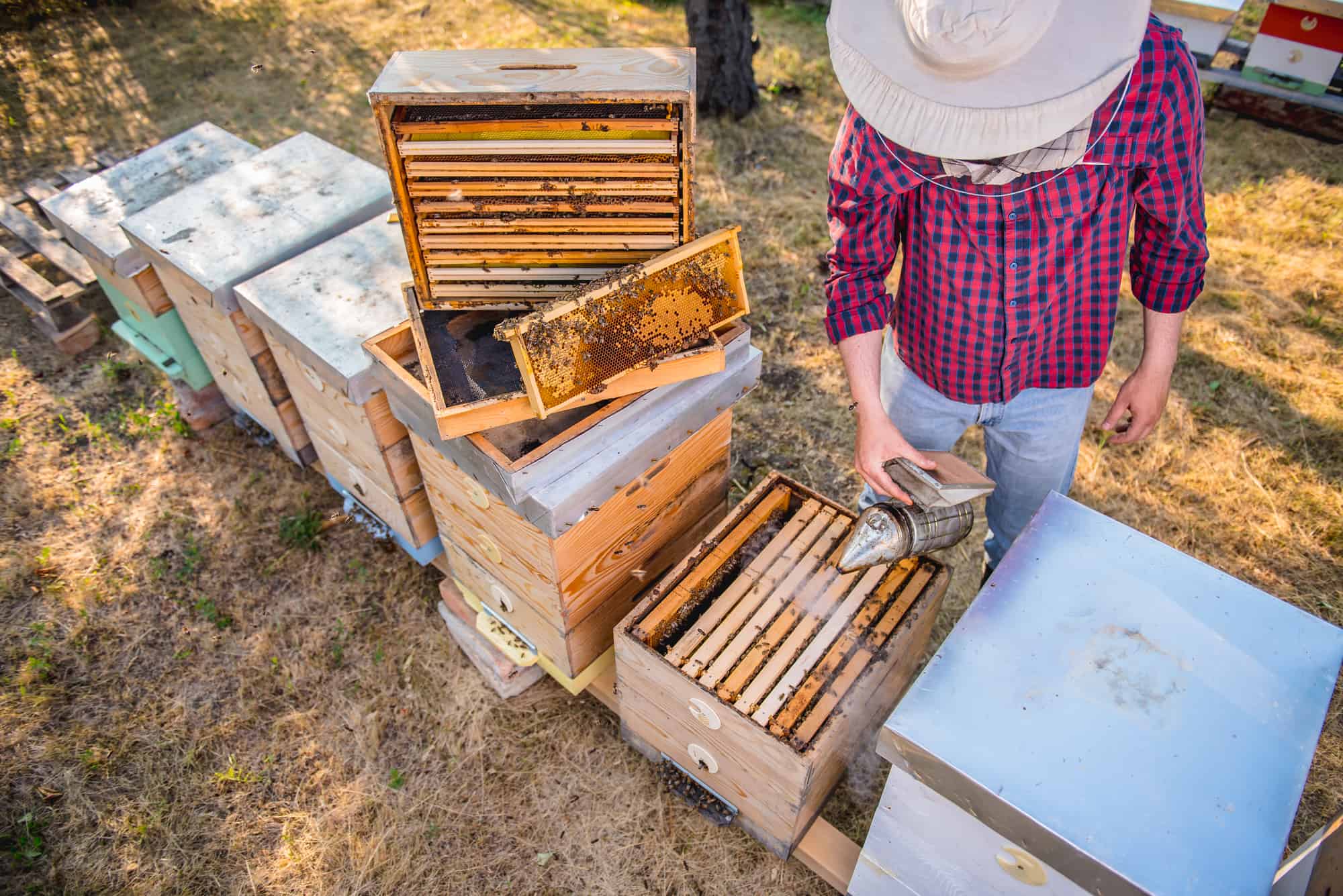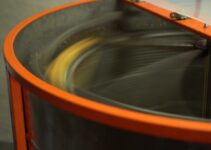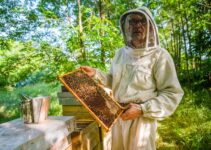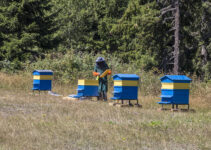Bee suits can be hot and uncomfortable, and gloves can be cumbersome and difficult to use when working on your beehives. You may see some beekeepers working without a bee suit or gloves and wonder how this is possible and whether you should emulate these beekeepers.
Some beekeepers do not wear a bee suit or gloves when working on their hives because they believe they can “read” the bees’ mood, and the protective gear reduces comfort and dexterity. This practice is not recommended. Beekeepers should wear a bee suit and protective gloves to avoid stings.
Beekeeping without a suit and gloves is a controversial topic and one that you will need to determine for yourself. Your decisions in this regard should be based on safety and the type of bees you keep.
What Is The Purpose Of A Bee Suit And Gloves?
Beekeeping can be a hazardous activity or hobby, and when dealing with any potentially hazardous activity, safety equipment is available to protect the beekeeper from the dangers.
Just like woodworking requires eye and ear protection and guards on certain machines to limit the risks, beekeeping also has safety gear that limits the exposure to danger.
As in our analogy to woodworking, the onus is on the operator to use the safety equipment, but some people take the risk and do not use the recommended safety gear.
The beekeeper must evaluate the risks involved in keeping bees, which will determine their decision to wear protective clothing or not.
It is important to note that beekeeping has a very real danger of potential injury and even death if a swarm becomes aggressive and decides to defend its beehive aggressively.
The purpose of a bee suit and beekeeping gloves is to protect the beekeeper from sustaining too many stings while working their bees.
Bees see beekeepers as a threat, especially when the hive is opened for inspection or honey harvesting. The bees will defend their home and their colony by attacking the perceived invader in an attempt to get the beekeeper or threat to leave.
Why Do Some Beekeepers Not Wear A Bee Suit?
Even though wearing a bee suit is recommended, you will see some beekeepers not wearing a bee suit for protection.
There are several reasons for this; some are acceptable, and others are not a wise choice. The purpose of a bee suit is to protect the beekeeper from sustaining too many stings while working their beehives.
Some beekeepers opt to wear normal clothing rather than a bee suit and wear a veil over their heads to protect their heads, neck, and face from stings.
This practice is acceptable if you wear thick clothing so that the bees cannot penetrate the material with their stingers. This usually involves wearing multiple layers of clothing to increase the distance of the outer layer of clothing from your skin.
Certain beekeepers do not wear protective clothing while working these bees, which in my opinion, is unacceptable beekeeping practice. Some people are full of bravado and attempt to work their bees in a t-shirt and short pants, and a veil. They use the excuse that they can “read” the mood of their bees and can tell if the bees will be aggressive or not.
This irresponsible beekeeping practice can lead other new beekeepers to believe that this is a safe practice and that all the safety gear is unnecessary, which can lead to serious injury or death.
There are different bee species around the world, and some are more docile than others. Beekeepers in Africa do not consider working their bees without a bee suit. The bees are too aggressive to risk woking the hives with no protection.
European bees and some American bees are much milder mannered and can be worked with less extensive protection on certain occasions. However, it is always a risk since the mood of the colony can change very quickly based on the time of day, air temperature, and the type of procedure being done on the hive.
The Risks Of Not Wearing A Bee Suit
No beekeeper likes wearing a bee suit; they are hot, awkward, and uncomfortable, but they are necessary for protection.
Not wearing a bee suit is an extreme risk, since an attack by the bees can result in hundreds or thousands of stings, which can be life-threatening.
How many bee stings are too many? The number of stings that can be dangerous to an individual depends on size, body weight, and overall health. The general consensus is that 500 bee stings can be fatal to a child, while 1000 stings are dangerous for an average-sized adult.
Considering that a colony can contain anywhere from 20 000 to 80 000 bees, it is conceivable that a life-threatening number of stings can be inflicted very quickly.
The risk is significantly higher if the person has shown previous sensitivity to bee venom, but a dangerous, potentially life-threatening anaphylactic reaction to a bee sting can occur at any time, without warning, even if you have had no serious reaction to bee stings in the past.
It is not worth risking your life for your beekeeping! Suit up to prevent stings and stay safe is my recommendation to all beekeepers!
Why Do Some Beekeepers Not Wear Gloves?
It is not possible to work with African bees or Africanized bees without gloves; you will sustain too many stings on your hands.
European and most American bees that have not been Africanized are less aggressive and can be worked with a bee suit but no gloves in some circumstances.
Some beekeepers do not wear gloves for certain tasks, such as spring maintenance, before the bees become too numerous and protective of their honey stores.
An experienced beekeeper can work mild-mannered colonies without gloves by working gently, carefully, and methodically, not crushing any bees during the process or disturbing the bees too much.
However, this takes experience and an in-depth understanding of your bees. I would not recommend that any new beekeeper work on their hives without wearing a pair of protective beekeeping gloves.
What Are The Risks Of Not Wearing Gloves For Beekeeping?
Neglecting to wear beekeeping gloves will expose your hands to potential stings. While you can withstand a sting or two on your hands, the risks of developing a severe reaction to a bee sting remains an ever-present threat.
Bees can also find their way into your bee suit via the cuffs on the sleeves as you work in the hive, which can result in stings elsewhere on your body as well.
I would not recommend that any new beekeeper tries to work on their beehives without any gloves for protection.
Should You Wear A Bee Suit And Gloves?
Some people may consider me to be a conservative beekeeper, but even after many years of keeping bees, I still wear a full bee suit and protective gloves every time I go out to work on my bees.
My reasoning is that bees are not “tame” livestock animals where their behavior is predictable and readable, and the potentially devastating consequences are not worth the risk of working unprotected.
My recommendation to every beekeeper, whether new to the hobby or a seasoned beekeeper, would be to wear a bee suit and gloves to avoid stings as much as possible. It also promotes safety in the hobby and the industry and sets a good example to aspiring beekeepers!
Conclusion
The final choice of wearing a bee suit and protective gloves when working on your beehives is essentially your own decision. However, the dangers are real, and all it takes is one misinterpretation of the mood of the colony to have tragic consequences.
Wearing a bee suit is uncomfortable, and gloves may be cumbersome, but it is a small price to pay for good health and safety for beekeepers the world over!
References
Writer’s own experience.
https://bees.techno-science.ca/english/bees/the-beekeeper/bee-suit.php




